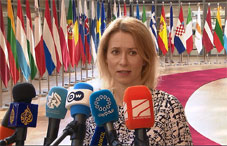
EU Warns Georgia of Consequences for Democratic Backsliding
By Liza Mchedlidze
Wednesday, July 16, 2025
The European Union has warned Georgia that its recent democratic backsliding "will come at a cost," as EU foreign ministers gathered in Brussels to discuss possible punitive measures against the ruling Georgian Dream party. Among the measures considered is the suspension of visa-free travel for Georgian citizens, a benefit in place since 2017.
Speaking after the EU Foreign Affairs Council meeting, High Representative for Foreign Affairs and Security Policy Kaja Kallas said that ministers "took stock of EU support to civil society and discussed different options - what more we can do." She confirmed that the options under review include suspending Georgia's visa-free travel regime, halting the Association Agreement, and imposing sanctions on individuals.
"The assault on democracy by Georgian Dream is growing more severe," Kallas said. "Georgia's democratic backsliding will come at a cost."
Earlier in the day, Kallas told reporters that EU ministers planned to send a letter to the Georgian government outlining specific conditions. According to reporting by RFE/RL's Rikard Jozwiak, the European Commission is preparing that letter with a deadline of August 31 for Georgia to take action or face consequences, including the suspension of visa liberalization.
During the press conference, Kallas addressed the content of the letter and emphasized that visa-free travel is a "big benefit" for Georgia. She underlined that Georgian authorities must uphold core democratic principles, including the freedoms of association, assembly, expression, the right to privacy, participation in public affairs, and protection from discrimination.
"This is not really in accordance with the first point that I pointed out," she said, referring to the imprisonment of opposition leaders.
Kallas made it clear that while the EU has so far avoided measures that directly affect Georgian citizens, this approach may change if the Georgian government continues to ignore EU standards.
"So far, we have kept this position that we don't want to hurt Georgian people, and taking away the visa-free regime is really having an impact on them. But at the same time, it's also an issue of the credibility of the European Union," she said. "If we've asked those things, and this is something beneficial or bonus we are giving to this country, they are not complying with these conditions, then there are also consequences."
Unlike most EU foreign policy decisions, suspending visa-free travel does not require unanimity among all 27 member states. A qualified majority, 15 countries representing 65 percent of the EU population, is sufficient.
In the days leading up to the meeting, Kallas and 18 other European foreign ministers, 15 of them from EU member states, issued a joint statement expressing "deep concern" over what they called an "anti-European" and "authoritarian" turn in Georgia. "It's not too late to reverse course," the statement read.
The EU had already suspended visa-free travel for holders of Georgian diplomatic passports in January. The rhetoric around broader suspension has escalated in recent weeks, especially in contrast to earlier statements by the EU ambassador to Georgia, who in June said most EU countries opposed such a move.
Tbilisi has accused Brussels of using the visa-free travel issue to "pressure" or "blackmail" the Georgian Dream government. When the idea of suspension first surfaced in April, ruling party members responded by urging the public to put "patriotism over comfort."
In addition to the visa-free travel issue, the EU also has a list of 15 Georgian individuals prepared for sanctions, including two judges, Kallas told journalists earlier in the day. She did not comment further during the press conference.
"No concrete decisions," Jozwiak wrote on X following the conclusion of the talks.

